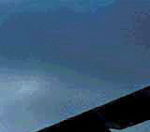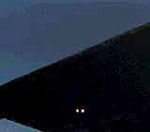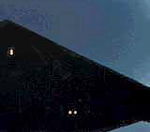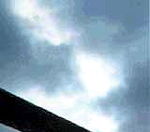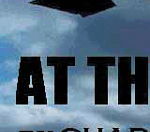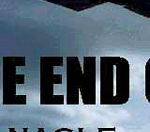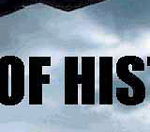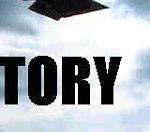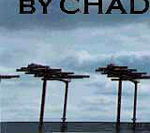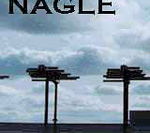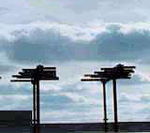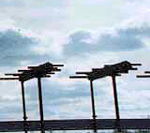Former
Antiwar.com columnist Chad Nagle sends this special report from
Washington.
October
31, 2002
Day
of Preemptive Protest Appeals to Patriotism
The
assortment of political demonstrations I've witnessed over the
years has accustomed me to the mainstream press and media's tendency
to manipulate the numbers game. Marches of several hundred against
Alexander Lukashenko in Belarus or Hugo Chavez in Venezuela get
reported by Reuters, AP or CNN as numbering from ten to twenty
thousand, while a demonstration in Argentina against the pro-IMF
government – which looks to number half a million in photos taken
from above – is lucky to be estimated in the six-figures. I've
generally chalked these distortions up to the free media's mutation
in the post-Cold War era, but it's hard to pinpoint their exact
origins.
The
first report I read of the demonstration in Washington, DC on
Saturday, October 26th (the first I had ever attended
in the United States) came from the Associated Press, estimating
the size at 100,000. This number was in line with my own estimates
on first arriving at Constitution Gardens, on the grass next to
the Vietnam War Memorial, at about 11:30 a.m. But I couldn't form
a clear picture from simply traipsing around in the crowd. Placards
blocked the view in every direction as far as the eye could see,
and heavy rains the night before caused me to sink into the mud
in the big empty areas scattered amid the horde of people.
I
heard cries of disbelief from several marchers, evidently from
out of town, upon discovering that "marching on the White
House" was at best an "abstract" concept because
of the barricades Bill Clinton had erected a decade ago. As I
walked near the front of a crowd of 7,000 or so that headed off
in the direction of the Rose Garden, the hopelessness of proceeding
along the street running along the south edge of the lawn (itself
almost out of sight of the presidential mansion) was palpable.
Adding to the dashed hopes, the Ellipse (the grass area north
of Constitution Avenue across from the White House's iron fence)
was also off-limits, and there would be no stopping. From our
vantage point, government really did feel like it was getting
more remote from the people.
This
initial group moved up 15th Street past the Treasury
Department and Pennsylvania Avenue, also blocked off by police,
until it could turn left on H Street along the north edge of Lafayette
Park across from the White House. It soon met the main column,
which had marched in a clockwise direction up 17th
Street and turned right on H. Anyone who even looked like a protester
was barred from entering Lafayette Park. The large crowd circling
the White House was so remote from President Bush that he could
have been sitting inside drinking tea the entire time without
noticing. I stood watching the procession of every imaginable
type – from clean-cut, conservative-looking young couples, to
Palestinians dressed in traditional Arab garb, to post-modern
punk types with peace signs and slogans painted on their faces
– lumbering by, banging drums, playing instruments, and chanting.
From what I could judge at this time, the crowd numbered no less
than 200,000 and may even have been as large as a quarter of a
million. When I factored in the possible exaggeration of an activist
yelling to the crowd through a megaphone that there were "over
300,000 of you here," I figured I was probably about right.
This
multitude's mood was so non-violent, I thought to myself, that
it wouldn't have caused any trouble if the police had allowed
them to get close enough to press their faces between the bars
of the White House fence on Pennsylvania. This wasn't because
the loud police helicopters hovering overhead or the snipers on
the roofs were overly intimidating, however. The police themselves
testified to the peaceful nature of the crowd. Suddenly running
into DC Police Chief Charles Ramsey in the middle of the street,
I overheard him tell a questioner that there was nothing to worry
about in terms of arrest because "these are good people."
There wasn't even any of the hooliganism or exhibitionism that
accompanied the anti-IMF/World Bank demonstrations the previous
month, although a handful of arrests were made. A woman carrying
a sign reading "Dykes for Peace" and inviting people
through a bullhorn to "take their clothes off" to stop
the war received no takers.
MY
COUNTRY, RIGHT OR LEFT
The
organization with the highest profile on Saturday, International
A.N.S.W.E.R. (Act Now to Stop War and End Racism), had put
together a line-up of famous speakers including the actress Susan
Sarandon, former Attorney General Ramsey Clark, and Rep. Cynthia
McKinney (D-GA). A.N.S.W.E.R. was acting as an umbrella group
for a host of mostly leftist organizations, many of whose members
sadly felt the need to hold their banners and placards up during
the speeches so that people further back couldn't see. A number
of American flags waved in the crowd. On several, the stars had
been arranged in a peace sign, but there were several standard
Old Glories as well. I didn't hear all the speakers, but those
I did hear weren't using the limelight to lash out at capitalism.
For the most part they seemed to be encouraging protesters not
to give in to fear.
Susan
Sarandon, the most eloquent orator probably by virtue of her profession,
said, "I am here because I am tired of being frightened to
speak out," and boldly claimed a "dormant majority"
of Americans was waiting to for a politician who could confront
"oil men ready to expand their influence with new contracts
on the soil our bombers have plowed." I never caught a glimpse
of Ms. Sarandon's attractive face with its slightly bulbous eyes
(which – I've always thought – have the power to make any man
feel guilty) because of the obstructive placards and banners.
But from what I could hear, her performance on the day couldn't
be seriously faulted.
Outgoing
Congresswoman Cynthia McKinney spoke briefly in a straightforward
patriotic appeal:
I
cannot come here to this place, at this time, with all of
you, without first saying: 'Thank you, Paul Wellstone, for
your wonderful example of warrior-patriotism – fighting for
our children, fighting for education, fighting against discrimination,
and fighting against war.' And thank you – all of you – for
being here today. We know that when good men do nothing, evil
triumphs. That's why we're here today, so that it can be never
said that we, the good people of the United States of America,
did nothing in the face of evil.
And
sadly, even our own country is not the same as it used to
be. The good old days are gone, but the bad old boys remain,
and dangerous changes are taking place daily. Even after a
jury found that the FBI went too far against Judy Berry and
Daryl Churney, their families still don't have justice. The
USAPATRIOT Act and the Secret Evidence Act erode our constitutional
rights. The savings of generations of Americans are being
spent on the military and intelligence communities, while
poverty and homelessness affect millions in every city in
America. And now, this administration wants to take us to
war against Iraq. Yet all across our country, and those of
our allies, veterans of the last war against Iraq still suffer
the health effects of Gulf War Syndrome. Our Vietnam-era veterans
still suffer from exposure to Agent Orange while a new generation
of veterans is reeling from depleted uranium, and they have
not been taken care of. Twenty-five percent of all the homeless
men and women who sleep on our streets every night are our
veterans to whom we've already broken our promise. How many
more veterans does George W. Bush want to create, to whom
we'll yet again break our promise? Mr. President, please look
at the veterans who are sleeping on the streets right across
from your window in the White House. Our government can monitor
our cell phones, the keystrokes on our computer keyboards,
the books we read at the library, but they can't give a warm
meal and shelter to the veterans who have served our country,
and who are now in need. In the last year alone, the Navy
in one port was able to move twenty million pounds of ammunition
to support Operation Enduring Freedom. Something is terribly,
terribly wrong.
And
what about the young men and women who now find themselves
on the front lines, deployed in faraway places like Oman,
Djibouti, Bahrain, the Philippines, Uzbekistan, Colombia,
Macedonia, Peru, Afghanistan, Pakistan, Iraq, Korea, Japan,
Bosnia, Saudi Arabia, Georgia, Tajikistan, Burundi, Australia,
Nigeria, 37 European countries, 12 former Soviet Union countries,
15 Asian and Pacific countries, 21 North African and Southeast
Asian countries, 27 African countries, 29 Western Hemisphere
countries? George Bush signed an executive order waiving the
administration's obligation to pay them their high-deployment
overtime pay. If he would do this to our troops when we need
them most, what will he do to us? We only need remember Florida
to answer that question. And let us remember, it's easy to
talk about war if you've never been to war. George Bush, Dick
Cheney, Richard Perle, Paul Wolfowitz, Rush Limbaugh – where
were you when your country needed you?
We
swam into the Vietnam War with the Gulf of Tonkin Resolution
and it turned out not to be true. Our strength and courage
are being tested right now. We can stand back and do nothing,
or we can protect our Republic from abuse. We are gathered
here today representing every slice of America. Despite all
of our differences, we are here today with one desire: to
return America to her true ideals. Don't be fooled by what
they may say about you. You ARE the true patriots. Our first
"President George" spoke about you. He spoke about
what happens to true patriots. He warned us to beware the
empty bellicose flag-waving of those who hold themselves out
to be patriots. He warned us against false patriotism. He
cautioned that the true patriot, the one who most loves his
country, will become suspect and odious, and will watch while
the false patriots usurp the applause of the people. But the
true patriots will know that our country's founding interests
are being surrendered. That first "President George"
was George Washington in 1796. We've known true patriots in
our day, like JFK, RFK, and MLK. But you too are patriots,
and today you're standing up for what is right and good about
our country.
Against
today's backdrop of Washington, DC, the most powerful capital
on the planet, I dream of a day when the power of love replaces
the power of might. That will be the day when our world will know
the blessings of peace, and our Republic will once again be in
the hands of the American people. Thank you.
While
majorities don't necessarily determine truth, I was pleased to
feel that on this day truth was definitely nestled somewhere within
the disparate and untidy mass that made up the antiwar demonstrators
as they loudly cheered on Rep. McKinney. I'd read a report a couple
of days before the rally that the Washington, DC Chapter of Free
Republic had organized a counter-demonstration three blocks
away, so I headed over. What I found was about fifty people scattered
around a small podium listening to a man dressed as a Muslim cleric
ranting against Saddam Hussein. I asked a middle-aged gentleman
in a baseball cap who this was, and he told me he didn't know
but said a demonstration of Iraqis had been going on across Constitution
Avenue a little earlier and the Free Republic group had invited
them over. "I'm sure glad the Iraqis came," he added.
"It's pretty spectacular, isn't it?"
Yes,
spectacularly pathetic. Without the Iraqis, the Free Republic
demonstration might have been in the range of thirty or thirty-five
people. As it was, the Iraqi cleric yelled "death, death
to Saddam" as a handful of bellicose flag-wavers cheered
him on. The Iraqi proudly announced he had been in the United
States for twenty-five years, which may have explained why his
Arab accent seemed slightly contrived. He actually had to try
to sound foreign, making plenty of "mistakes" while
he spoke.
A
short, blond bearded man dressed in a black suit came up to speak
next, and a middle-aged woman told me he was Kristinn Taylor,
head of Free Republic's D.C. chapter. "He's Icelandic,"
she said proudly. There are probably hundreds of thousands of
Americans out there willing to say just about anything to be noticed,
in the hope they'll be offered some miserable slot in the government.
When Hanna Arendt first met Adolf Eichmann, she was famously struck
not by a feeling of being in the presence of a monster, but rather
by how – in the final analysis – Eichmann was nothing more than
an ordinary government functionary eager to please his superiors.
Taylor looked like that sort of person.
He
said he had spoken to some college students who had come over
from the other rally, where people "were talking about socialism."
It must have been when I wasn't there because I never heard any
of the people on the A.N.S.W.E.R. podium mention socialism. Then
Taylor said that it was "unfortunate" that they encounter
"anti-Semitism" when "they go to some of these
antiwar rallies," and that "some people are selling
The Protocols of the Elders of Zion." Again, I never
saw this bit of propaganda among the antiwar crowd, but I did
see some bumper stickers that said "Think Vegan." Taylor
said he'd seen "several swastikas" at an A.N.S.W.E.R.
rally on April 20th, and went on that "if people
want to see where anti-Semitism leads, you can look behind you
over your shoulder" and "see the Holocaust Museum over
there." He said there had been "other holocausts"
since Hitler, "like what happened in Rwanda during the Clinton
administration" – as if the Bush administration would have
invaded that dirt-poor African state at the height of its last
civil war!
The
Free Republic leader said that America "as a society and
a civilization" had "a responsibility to stop these
dictators before they become entrenched." Then, when a young
Arab-American wearing a Palestinian flag-colored hat yelled something
about Israeli slaughter of Palestinians, Taylor responded, "Israel
is a democracy," his voice never rising but his cheeks acquiring
that sudden ruddy, flushed look. Israel respected freedoms, he
said, as evidenced by all the Arab citizens of the Zionist state.
He neglected to mention that Arab representation in the Knesset
was mysteriously only a tiny fraction of the percentage of Arabs
in Israel's population as a whole.
Looking
around at the placards at Free Republic's rally, many of them
resting on the ground, I noticed strange slogans. My first impression
of one that read, "In the kingdom of the blind, the one-eyed
man is king," was that it was a cynical rebuttal of a placard
I'd seen earlier in the antiwar crowd: "An eye for an eye,
and before you know it everybody's blind." Another said,
"You Commies lost? Go home!" and showed a map of the
US and Cuba, with arrows pointing to Cuba. Posted on the door
of one of the port-o-johnnies was a sign that read: "Note
to antiwar protesters: Your rally has toilets. They're not as
clean." But the most thought-provoking slogan I saw at the
little Free Republic gathering was this: "Axis of Evil –
Saddam, Farrakhan, John Muhammad."
FREE
REPUBLIC OR REPUBLIC OF FEAR?
The
climate of fear at the tiny Free Republic rally far exceeded the
demonstration's actual size.
After
the young Arab-American with the Palestinian floppy hat finished
yelling at Kristinn Taylor, the "Iraqis" came over to
talk to him, and I got a feel for how big they were close-up.
Three mullah-types approached, and I couldn't help but be struck
by the fact that their beards all seemed a little too neatly-trimmed
for the average mosque-going Middle Easterner. They got right
up in the young man's face to reprimand him, and some large, plain-clothes
Arab associates crowded around behind their would-be Islamic spiritual
guides for support. Whatever they said to the lad must have worked,
since he turned and left soon afterwards in the direction of the
antiwar rally.
The
core of the War Party's political strategy is, of course, instilling
fear in ordinary Americans, and the cheap-shot placard of the
"Freepers" linking John Allen Muhammad to some wider
evil was a perfect example. Instead of an unfortunate, homeless,
ex-military drifter with mental problems (for some reason – much
as with Lee Harvey Oswald – the media rarely mention that Muhammad
is a decorated war veteran), the sniper is portrayed by the War
Party as an al-Qaeda operative. This sort of conspiracy theory
is somehow okay with the fine folks at Free Republic, while –
for example – suggestions that Minnesota Sen.
Paul Wellstone's death was assassination are not.
Even
leaving conspiracy theories aside, by now it's clear that 9/11
could hardly have played better into the hands of the War Party
and its "Freeper" cheerleaders if it had been planned.
Yet, as tens of thousands of antiwar demonstrators were getting
back on their buses to begin their long journeys home on Saturday,
it was unlikely many of the millions of Americans settling in
to watch the sixth game of the World Series appreciated the potential
of the intensified "state of war" atmosphere to ultimately
make their day-to-day lives a living hell. The increased surveillance
apparatus growing out of the "war on terror" policy
of this government, Republicans and Democrats alike, calls for
courage on the home front. As Susan Sarandon said, her voice cracking
at times: "Mr. Bush, you have hijacked our pain, our loss,
our fear, and you have convinced many that to fight preemptively
is the only way to protect our democracy." It's really the
"fear" factor that should be at the heart of the antiwar
movement's concerns, because the fear level will determine the
future of the Republic that Cynthia McKinney alluded to in her
speech. If the Bill of Rights is snuffed out altogether because
Americans are too afraid to fight for it, America will no longer
have anything to do with its ideals but will instead be some sort
of caricature. Marches are a visible way of resisting. While one
protest of 200,000 may only shut down the center of one city,
similar protests in, say, ten cities at once could actually attract
some serious attention in the corridors of official power.
Finally,
while most of the marchers on October 26th may not
have fit in with most Americans' aesthetic sensibilities, at least
they were taking part and they weren't afraid. Appearance does
matter in winning hearts and minds, something Martin Luther King
understood. Whatever many on the right may think about Rev. King,
he was certainly clever enough to see that it's more difficult
to justify spitting at a man wearing a suit and tie, especially
if the spitter's gut is hanging out of his jeans and t-shirt and
he's wearing a dirty baseball cap. But however ghastly some of
the antiwar protesters may have looked to many members of middle-class
Americana, I would rather march next to them than have to associate
with the dishonest, informer-like suit-and-tie wearers of Free
Republic.
THE
'COMMIE' FACTOR
Late
Saturday afternoon, I was sitting in Foggy Bottom metro station
waiting for a train and a small, middle-aged gentleman with thick
glasses and frizzy hair came and sat next to me. He was holding
a newspaper called Freedom
Socialist, the organ of one of the many revolutionary
socialist parties, and he said something about having to wait
so long for a train. I said three orange line trains had just
gone through in succession, to which he replied that I'd missed
a blue line train because I was asleep. He'd been watching me,
he said.
He
was a mild-mannered and very personable man who said his party
was feminist but had a heavily gay component. The Socialist Workers
Party, he said, was a Trotskyite organization that had split away
from the Communist Party of the USA (CPUSA)
long ago, while Workers World
was also Trotskyite but had split off from the Socialist Workers
Party. A.N.S.W.E.R., he said, was a "front" for Workers
World.
"What
about the United States Marxist-Leninist Organization (USMLO)?"
I asked. I'd run into a young man carrying a big Soviet-style
red flag with the letters "USMLO" on it.
"I'm
not sure, but I think they're a Maoist organization," he
said.
"The
Progressive Labor Party?"
I'd seen one of their comrades calling for a Communist revolution.
"They're
also Maoist, I believe," he said. He was getting confused
but still tried to be helpful. "I noticed the Spartacist
League were mostly dressed in black today, which is something
new for them. I think they're going for an anarchist look, but
they're actually Trotskyite as well."
"One
can only imagine what Rosa
Luxemburg would have thought about her party deciding to follow
a Bolshevik after her death," I said. Prussian military officers
had murdered
Rosa Luxemburg in Berlin in 1919, but Lenin and the Bolsheviks
were not sorry to see her go.
"Oh,
maybe not," said the man. "You know, I'm not really
sure, but I think all the socialist parties are seriously thinking
about ways to unite." He said some of the socialist parties
were more interested in starting street fights with other socialist
parties than combating the bourgeois class enemy.
We
rode the train together, and I enjoyed talking to him. Although
inside he could conceivably have had the germinating brain of
Nikolai
Yezhov, he seemed a decent and thoughtful individual and reacted
perfectly amiably when I told him I was covering the demonstration
for a libertarian website. When we reached his stop and he realized
suddenly where he was, he flew out the door of the carriage before
standing on the platform, looking hopelessly lost. "Nice
talking to you," I said after him before the doors closed.
He turned, startled, and with a genuinely kind smile gave me a
raised fist salute by way of taking his leave. I waved.
The
incident contrasted sharply with an episode several years ago
in London, when I'd gone to a meeting of something called the
Stalin
Society. An ad in the paper described it merely as a group
devoted to studying and discussing the historical legacy of Stalin.
But when I arrived I found a strange collection of people who
looked as if they had brushed cobwebs off themselves to leave
their flats, with dust still heavy on their spectacles. A man
started reading something he'd written about Stalin, praising
the dictator for his wonderful achievements and explaining how
Trotsky and the other Bolsheviks had attempted to subvert and
derail the Revolution but had been caught and justly sentenced
by the great leader. At the end of this bizarre spectacle, an
old woman approached me, evidently wishing to acquaint herself
with a newcomer. In a very friendly way, she asked why I'd come,
and I told her I had seen the announcement and had always been
interested in the Bolshevik era. When she asked what I thought,
I said I found it extraordinary that people could sit around talking
about Stalin in positive terms so matter-of-factly. It seemed
like bad comedy to me.
"Oh,"
she said, one eyebrow raised, but still friendly. "So you're
a Trotskyite, are you?" It was as if, although Trotsky was
a great heretic, at least the Stalin Society could tolerate and
even appreciate one of his followers – as a "known quantity"
– in their presence.
"No,
of course I'm not a Trotskyite, for God's sake," I replied.
"What sort of person sympathizes with Bolsheviks?"
I
was still speaking to her at a volume that precluded anyone else
in the room hearing, but she blew up at me. "How dare
you speak like that!" she screamed. If I couldn't appreciate
what they were doing I could just "bloody well LEAVE!"
All eyes were on me as she stormed off, and I realized she was
both serious and mentally disturbed. She would have been a prime
candidate, I thought to myself, to sit in the dock at a Stalinist
show trial and finger her comrades. But I let go of my sadistic
visions, got up, and left during the middle of a speech about
the glories of the White Sea Canal.
Unlike
the woman at the Stalin Society, the representatives of the revolutionary
Communist parties with whom I spoke on October 26th
were all remarkably pleasant. Apart from one chap I chatted to
– a Socialist Workers Party member who said that real change
had never been achieved through elections, but only when discontent
had spilled over into violence at street level – all of them
seemed flaky enough to be more like interesting curiosities than
a real political presence at the protest. I actually contributed
to two of them. When I discovered that the newspaper of the Socialist
Workers Party was actually The
Militant, I went back to the person selling the Socialist
Worker newspaper and found out it was the organ of the
International
Socialist Organization. I bought a copy of both, thus donating
$2.50 to the international Marxist-Leninist revolutionary class
struggle. With such confusion as to names and identities, I doubted
any of these people would show enough of Lenin's organizational
genius to pull off the October 1917 in Washington 2002. International
A.N.S.W.E.R., which acquired the permit for the protest, had organized
a large, peaceful exercise of First Amendment rights. While it
may only have been a "front" for the Marxist Workers
World party, therefore, the fact that it felt the need to operate
as a "front" and stick to "bourgeois" rhetoric
may be an indication that America isn't ready for Workers World's
style of revolution.
One
memory stands out from the day. A conservative-looking, fifty-ish
man was walking near me with his wife and another couple – no
less conventional in their appearance – carrying a large flag
with a picture of Planet Earth on a dark background. I asked him
what the flag stood for, and he told me it was from an organization
called "Not In Our
Name" (NION). I asked him who they were, and he said
he wasn't sure but that he loved the flag. "It is a beautiful
flag, isn't it?" Yes,” I replied. It was a beautiful flag.
Then he pulled a NION pamphlet from his pocket and gave it to
me, and I was suddenly overcome with the distinct feeling that
although we were strangers who knew nothing about each other,
we were definitely on the same side that day. To those Americans
with misgivings about war on Iraq but also an aversion to joining
demonstrations for fear of rubbing shoulders with "Commies,"
here is one "old righty" who joined in and lived to
tell the tale. It was worth the trouble.
–
Chad Nagle
|
Write
to Chad Nagle
Chad
Nagle is a professional writer and lawyer. He has been published
in the Wall Street Journal Europe, the Washington Times, and several
other periodicals. Mr. Nagle traveled extensively throughout the
ex-USSR from 1992-97 as a research consultant. Since mid-1999,
he has traveled widely in the former Communist bloc on behalf
of the British
Helsinki Human Rights Group.
Previous
articles by Chad Nagle
Day
of Preemptive Protest Appeals to Patriotism
10/31/02
House
Panel Rushes to Join the (War) Party
10/7/02
Will
Congress Rubber-stamp an Unpopular War?
9/21/02
A
Sensible China Policy For The American People
4/27/01
Hainan
Dim-Sum: Feeding a Bully's Sinister Agenda
4/17/01
The
Revolution Comes to Ukraine
3/30/01
Red
Dawn in Moldova?
3/16/01
Musings
On The New Imperialism and Post-Western World Government
2/23/01
Soros:
False Prophet-At-Large
2/9/01
Belarus:
Oasis In The Heart Of Europe
1/26/01
Serbia
Joins the West
1/12/01
Death
of a Patriot
8/31/00
The
Twilight of Sovereignty in Azerbaijan
7/14/00
The
Ukrainian Model of Democracy
5/5/00
The
Slow Strangulation of Democracy in Slovakia
3/28/00
Patrick
Buchanan and the American Reformation
1/25/00
The
Betrayal of Democracy in Post-Soviet Georgia
11/30/99
|
